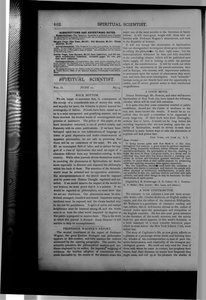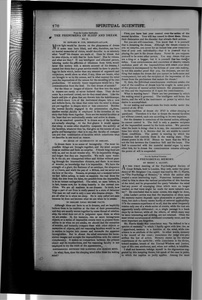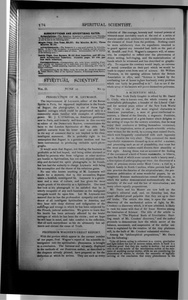Rock Bottom
We are happy to announce that, in consequence of the receipt of a considerable sum of money this week, and security for more, the Scientist is placed beyond the contingency of failure. Friends have been raised up to us in a most unexpected and gratifying manner, and we have received the kindest words of encouragement and promise of assistance. The policy of this paper, as we have heretofore remarked, is one of perfect comity and fraternity with its sister publications. If we have been betrayed upon one or two indiscretions of language at times of great depression and under circumstances of apparent provocation, we are safe in promising that there will be no recurrence of the same. We aim to fill an unoccupied field of labor, and to attract the support of a class of Spiritualists who need an organ of a character different from any heretofore existing in this country. While other journals devote themselves mainly to recording the phenomena of Spiritualism, we desire more especially to discover and expound the philosophy which lies back of them. The attention of the Scientific world must be arrested and its opposition overcome; the misrepresentations of the church must be exposed and its power over Human Thought regulated and curtailed. If we would deserve the respect of the world for our Science, we must prove that it is a science. If we would be regarded as philosophers, we must show that we are not charlatans. Our phenomena must be scrutinized, arranged, classified and tested. Imposture among mediums must be exposed, and the cheats handed over to the law for punishment. A spirit of union and mutual helpfulness must be fostered among us, and the truths sent to us from the other world imparted by degrees as the public is prepared to receive them. This is the work to which this journal is devoted: thank Heaven! It will survive to help its accomplishment. And now?!
The Phenomena of Sleep and Dream
Much light would be thrown on the phenomena of dream if some man born blind, and who, therefore, can have no mental memories of vision, would describe to us minutely what “stuff” his dreams are made of. Does he dream that he sees objects, or only that he feels them? Has he visions, and what are they? If any intelligent and educated person, laboring under the affliction of blindness from birth, would favor this society with a minute account of his dreams, I cannot but think that a great service would be done to psychology by facts which, better than any amount of argument and conjecture, would show us what, if any, ideas are innate, what are brought to us by the senses, and in what manner the mind uses the impressions of the senses for the moulding of its own productions. Of scarcely lesser Importance would be a like communication from the deaf. Do they dream of sounds?
But the ideas or images of objects that flow into the mind in dreams are rarely or never isolated ideas. They do not come la a confused crowd, nor do they stand alone. Like the beads and bits of glass that are thrown into the kaleidoscope, and which every turn of the instrument shapes into a new and definite form, the ideas that come into the mind in dream are put together in shapes more or less connected. Besides the mental faculty engaged in the presentation of ideas, another mental faculty is employed in the invention of the story that links them together. Here are two mental faculties at the least that are undoubtedly awake and active in dream.
It is an unsolved question if in dream any of the faculties are actually sleeping. At the first glance it would appear that sleep or some other disability suspends the activity of the faculties, whatever they be, that give us the senses of congruity and incongruity—that is to say, the faculty of comparison and that combination of faculties which constitutes what we describe in one word as reason.
In dream there is no sense of incongruity. The most impossible things are brought together, and the mind accepts them as realities and feels no surprise. Friends long dead are with us, and we do not wonder why. We do impossible things, and forget that they are impossible. We walk upon water: fly in the air, are transported hither and thither without passing through the intermediate distance, and there is no sense of wonder, no knowledge that it is impossible. We have the strength of a giant, the fleetness of an antelope, the eloquence of a Cicero, and wield the pen of a Milton, and we never ask the how or the why. Reason, so prompt, not a moment before we had fallen asleep, to make us separate the real from the ideal, the true from the false, the possible from the impossible, is in an instant extinguished. The mind, so sane before, is, in fact, insane now, for in sleep insanity is the normal condition. We are all madmen in our dreams. In truth, how large a part of our lives is really passed in a state of delusion! The man we call mad is only a man who dreams always. We are all what he is when we sleep. He is only called not sane because he does not become what we are when he is awake.
Although ideas are facts to us in dreams, and we implicitly believe them to be realities at the time of their presentation, and they are usually woven together by some thread of relationship, the mind does not sit in judgment upon them as when we are awake. If, for instance, two or more incongruous objects or a series of impossible events were to present themselves to us when we are awake, we should feel the sensation of wonder, and instantly compare them with other objects or memories of objects, and our reasoning faculties would be set in motion to inquire into causes and reconcile the apparent incongruities. But in dream the mind entertains the inconsistent images and accepts the impossibilities with the utmost complacency. It makes no comparison between the present object and its recollections, and the reasoning faculty is not employed to try the truth of the appearances.
In what, then, does the sleeping mind differ from the waking mind?
First, you have lost your control over the action of the mental faculties. Your will has ceased to direct them. Hence their dislocation and the disorder that attends their actions.
But you are still conscious. You know that it is yourself that is dreaming the dream. Although the dream creates in you no surprise, you never for an instant lose your consciousness of your own individuality—that it is yourself that is playing the part in the dream drama. Never do you suppose yourself to be some other person. You may dream that you are a king or a beggar, but it is yourself that has risen or fallen. Your consciousness and conviction of identity remain unshaken amid all the impossibilities with which your ideal existence is encompassed by the fictions of your own making. Is not this another proof that you, the dreamer, are not the thing that makes the dream (for you cannot be both cause and consequence), but only the recipient of the impression of the dream from the mechanism that makes the dream?
If, then, the individual consciousness continues awake, the seat of the condition of dream is to be sought in some parts of the process of mental action between the presentation of an idea and the impression of it upon the consciousness.
What is wanting here? There are two processes by which' the waking mind is governed. The intelligent self forms the desire, and the will is the instrument or power by which that desire is accomplished.
In our waking and normal state the brain works under the control of the Will.
In the condition of dream the Will is either sleeping or paralyzed. Therefore it is that in dream the mental faculties act without control, each one according to its own impulses.
But the dreamer is conscious of the mental action, although he cannot control it. The Self is only a passive recipient of the impressions caused by the brain action. We perceive what the brain is doing—that is to say, the successive conditions into which it is thrown—but we are unable to control those conditions. The power is wanting by which the Conscious Self controls them in the waking state. That absent power is the Will. Hence we learn that the Will is not the link between the Conscious Self and the brain. The Self is connected with the material mental organ by some other link, for in dream the consciousness remains although the power of will is suspended.
Persecution of M. Leymarie
The imprisonment of Leymarie, editor of the Revue Spirite in Paris, for supposed implication in the frauds of Buguet, the photographer, is one of those, highhanded outrages which could be perpetrated only in a community made familiar with examples of arbitrary power. Mr. J. L. O’Sullivan, an American gentleman now in Paris, and formerly well-known in this country as editor of the Democratic Review, communicates the facts to the London Spiritualist of May 28th. We publish extracts from his letter and can add little in the way of comment that is not implied in his clear, intelligent statement. He is probably right in his assumption that Buguet is a genuine medium and has been instrumental in producing veritable spirit photographs.
It would seem that Buguet, not finding the business as profitable as he had hoped, and being either alarmed or bribed by persons who from religious or other motives are hostile to Spiritualism, has not only abjured mediumship and declared his spirit photographs to be frauds, but has had the audacity to charge Leymarie with being his accomplice and the sharer of his nefarious gains.
No one who knows anything of M. Leymarie will doubt for a moment, that it] this accusation, Buguet utters a fiendish, unmitigated lie. Leymarie is a gentleman and a man of culture, and has given the most <... continues on page 3-67 >
Editor's notes
- ↑ Rock Bottom by unknown author, Spiritual Scientist, v. 2, No. 14, June 10, 1875, p. 162
- ↑ The Phenomena of Sleep and Dream by Cox, E. W., Spiritual Scientist, v. 2, No. 15, June 17, 1875, p. 176. From the London Spiritualist
- ↑ Persecution of M. Leymarie by unknown author, Spiritual Scientist, v. 2, No. 15, June 17, 1875, p. 174
Sources
-
Spiritual Scientist, v. 2, No. 14, June 10, 1875, p. 162
-
Spiritual Scientist, v. 2, No. 15, June 17, 1875, p. 176
-
Spiritual Scientist, v. 2, No. 15, June 17, 1875, p. 174




